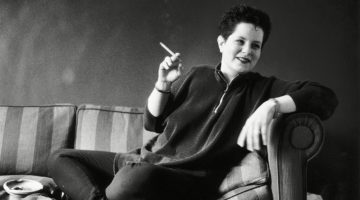Five Questions with MAGGIE'S PLAN Director Rebecca Miller
After a series of mildly received dramatic films, writer/director Rebecca Miller enters into the world of comedy with Maggie’s Plan. The daughter of legendary playwright Arthur Miller, the director has enlisted Greta Gerwig, Julianne Moore, and Ethan Hawke to tell her latest New York story. We spoke we Miller about Woody Allen, Bruce Springsteen, and Moore’s wacky Danish accent.
Scene Creek: There seems to be a certain Woody Allen-esque feeling to the film. Was he an influence or is that coincidental?
Rebecca Miller: I grew up with Woody Allen’s movies and you can’t not have Woody’s shadow over a film that takes place in New York among articulate people that is comedic. I guess what I was looking at most were 1940s movies like The Philadelphia Story, His Girl Friday, some Preston Sturges movies and also Eric Roemer movies. Not so much Woody for this, but at the same time of course Woody. Why not? Of course, but yet, no.
SC: What was it about the original novel that made you want to adapt it?
RM: I just loved the emotional geometry. I thought it was hilarious that a woman realizes that her husband is perfect for his ex-wife. There was something so both absurd and strangely possible about it. I also liked the fact that there was so much room for me to write. There was no pickle man yet, there were no friends. A lot of the plot hadn’t been filled out. On the one hand I had this very rich triangle and on the other hand I had a lot of room to put my own stamp on it. It was sort of a perfect combination.
SC: Georgette is a very interesting character for Julianne Moore, especially with that Danish accent. Was she always Danish or was that something you added when you wrote the script?
RM: Originally in the book she was French. I kind of felt like she couldn’t be French. We’ve heard a lot of French accents – I feel like we’re so familiar with that that I would have had to cast a French actress and I really wanted to cast Julianne. We talked about German, but felt that maybe that had too much baggage. We came up with Danish together and stuck with that. It was a character that stays more closely to the original book than any of the other characters, just in terms of how she is and what she’s like. I invented a lot of her dialogue – the whole ficto-critical anthropology element is something I injected. Julianne added that slight speech impediment where she can’t really say her Rs. That was so great.
SC: The film is undeniably lighter than your previous work. Is that something that you consciously wanted to explore when developing that project?
RM: Yeah. Some of my films can have very dark elements to them, but they always have some comedy. Sometimes when I’m listening to an audience it’s such a shot of pleasure when I hear them laugh. Even in The Ballad of Jack and Rose – which nobody thinks of as a comedy – has moments of levity. I remember thinking in screenings of that film how happy I was when people would laugh. Part of my motivation was just to change the ratio. It’s not that I had no humour in my films it’s just that the humour was outweighed by the dramatic elements. I think The Private Lives of Pippa Lee was a little more balanced, but still more on the dramatic side. I’m always interested in tonal shifts, like how you go from one to another. Chekov does it a lot. There are certain authors that are really good at big tone shifts; that’s something that’s really interesting to me.
SC: The song choice of Bruce Springsteen’s Dancing in the Dark is definitely very important to the film and its characters. Does that song have some importance to you and why did you choose to include it?
RM: I wanted a Springsteen song because in the book there’s a reference to Maggie not getting Springsteen in a way that John does. I thought it would be nice if Maggie tells him to turn it down and later Georgette loves it and knows all the words. That was one way of showing that Georgette and John have this shared task and music brings them together. It had to come back twice, whatever it was. I happen to know Bruce Springsteen, so I talked to him and his wife Patti about it and she said, “What about Dancing in the Dark? Everyone knows it, you should use that.” That’s why we got that song. They were very kind to let me use it. There’s also the idea that John is from New Jersey, he grew up in Atlantic City, there’s a whole thing about New Jersey for him and why Bruce would be so important.




